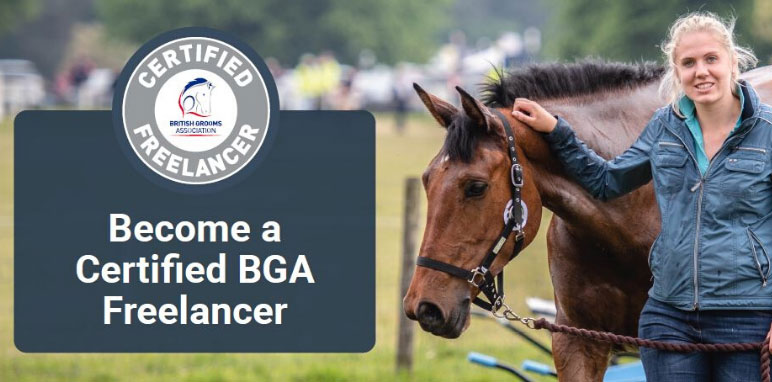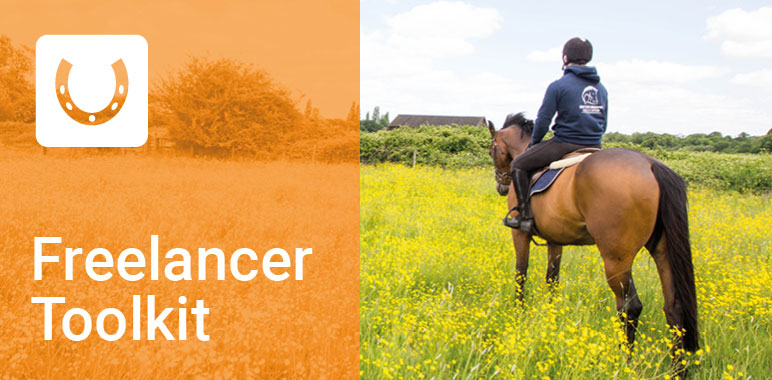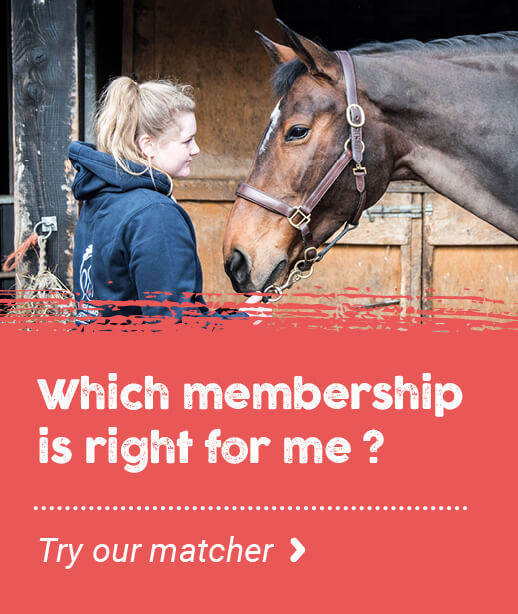- Join Now
- Login
- Member Zone
- Your Career
- Freelancing
- International Grooms Association
- BGA Training
- Healthy Yard Healthy Horses
- Transporting horses
- Brexit
- Safe workplace
- Student Zone
- Member Discounts
- BG Magazine
- Member services
- Training & Careers
- BGA CV Creator
- Horse groom training
- Where to Train
- BGA E Learning
- Career choices
- Change to Racing
- First Aid training for grooms
- Parents
- Grooms Jobs
- Grooms Life
- About
- News
- Contact


With 55% of respondents to our annual contract survey revealing that they don't have a written contract, Executive Director Lucy Katan is determined to change the equestrian industry's approach. "It baffles me why we still have a result on our most recent survey of 55% of grooms not having a written contract of employment! For years, we have educated the equestrian industry, both grooms, employers and parents, about the importance of this document. It seems that over half weren’t listening. Employers are legally required to provide employees with a Written Statement of Employment Particulars on or before their first day of work. (N.B. this is full-time, part-time and zero-hour roles) In the equestrian sector, this document is often referred to as a ‘written contract of employment’, and it outlines the key terms and conditions of your employment, such as: When I was a groom, I was given a written contract for just one job. This was the only time I was employed legally, and it felt good! I knew all the details of my employment, and having this signed document gave me peace of mind. I would never start a position of employment now without one. It is baffling to me why so many grooms do. When I founded the British Grooms Association (BGA) in 2007, it was when my mission began to see every groom employed with this legally required document. Some might shrug their shoulders and say, “It doesn’t matter; it is just a piece of paper.” But I passionately believe it is the crux of the first step of doing it right. I speak to grooms weekly who are in a tricky situation, and nearly every time, they don’t have the written contract in place. Fake notice periods, confusion over what happens with overtime, misunderstanding about probationary periods, disputes about annual leave entitlement, all of this must be outlined in the written statement/contract. The written contract protects both the employee and the employer. There are no winners by opting out of this employment legislation requirement. It is the employer's responsibility to provide this document. (But the groom can ask for it and opt to not start the role without one too – just a thought but maybe this is the way that the industry will ultimately change.) "It is too expensive” “That is just not what happens with horses” “I don’t bother, as others don’t bother” “Yes yes, I will give you one when you have been here 3 months” It is really simple; we have created the BGA’s sister organisation, the Equestrian Employers Association (EEA). With over 1,000 members and growing daily, including the likes of Carl Hester and Nick Skelton. The EEA has an online tool called the Contract Creator. Over 5,000 contracts of employment have already been created to date. This is how we are going to get a contract in every groom's hands (or email). So, I ask myself. Why do we still have 55% of survey respondents who don’t have one? Is this percentage representative of the problem in the industry? In actual fact, based on my repeated first-hand experience of asking this question to college students who have a job alongside their studies, and grooms around the stables at international events and grooms who pick up the phone to the BGA, I think in reality the figure is even higher. But what if every single groom in the land DID ask for a written contract and refused to start the job without one? But there is a problem with this great ideology. Many grooms are often young, desperate to land their first ‘dream job’ on a yard and even intimidated from the outset by a dominant employer. So, parents/guardians. I will now turn my attention to you. Would you allow your child to work in a factory without a written contract outlaying the terms and conditions of the employment? An establishment where they have no idea if they are actually being paid at least the NMW for every hour that they work. Where there is no health and safety adherence and even no employer’s liability insurance in place? No? Well, why do you let them work in a yard with the same conditions, I politely ask? Please don’t, it is just fuelling illegal practices, which is damaging to our industry and to all the Good Employers who play by the rules. If an employer hasn't provided this written statement, it's important to know your rights: Request a written statement: You can ask your employer for a written statement of employment particulars. Employment tribunal: If your employer refuses to provide a written statement, or you’re facing any other employment issues due to lack of contract, you can contact an employment lawyer or, as a last resort, take the matter to an employment tribunal. In any case, having a written contract of employment is vital to protect both you and your employer, so it’s important to address this issue." Join 1000’s of other grooms and belong to your professional association. Explore the comprehensive suite of HR and legal tools, expert advice, discounts and support available in the EEA.Its time to end the no contract culture
27th March 2025
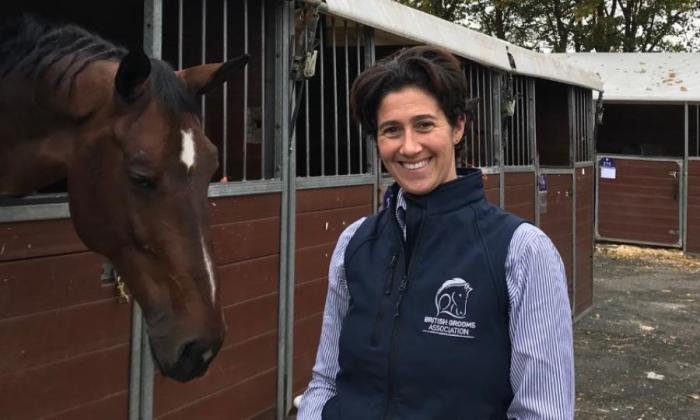
Just a piece of paper?
Whenever the written contract is not given… there is always trouble ahead.
The lack of a written contract being provided on, or before the first day of employment should set off loud alarm bells in any groom's ears (and their parents). There is never a position of Good Employment without this legally required document.
All of these phrases are what grooms are told. What a load of codswallop!It's time for change
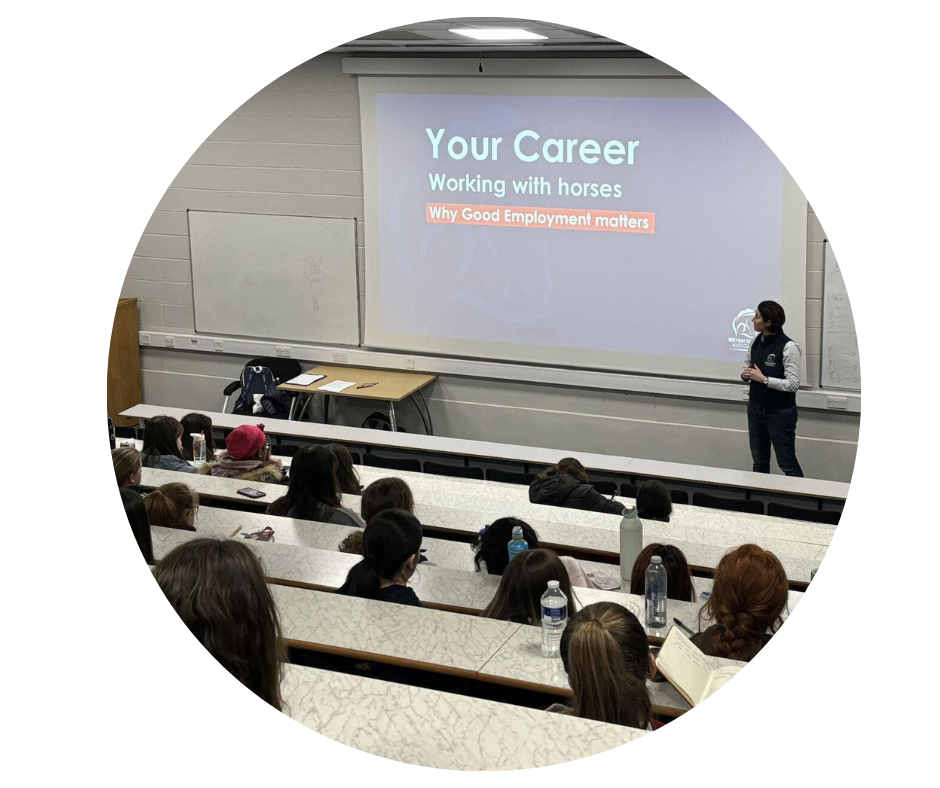
I am starting to change my approach to this problem. On my recent round of college and university talks, I attempted to empower the students regarding this issue.
The truth is that the groom or employee should not have to ask for a written contract.Would you allow?
BLOG ARCHIVE
- 2026 (3 ENTRIES)
- 2025 (14 ENTRIES)
- 2024 (52 ENTRIES)
- 2023 (60 ENTRIES)
- 2022 (35 ENTRIES)
- 2021 (24 ENTRIES)
- 2020 (19 ENTRIES)
- 2019 (45 ENTRIES)
- 2018 (36 ENTRIES)
- 2017 (7 ENTRIES)
What the personal accident policy covers you for:
- Whilst at work
- All stable duties – mucking out, grooming, washing off, turning out
- Clipping
- Riding – including hacking and jumping
- Hunting
- Lunging
- Breaking in
- Holding horse for a vet and other procedures
- Travelling horses both in the UK and abroad
- Competing in line with your job including: jumping, dressage, eventing
- Injuries that may happen to you whilst you are teaching - but you must also be grooming as part of your duties and not be a sole instructor
What the personal accident policy doesn’t cover you for:
- Riding in a race, point to point or team chase
- Stunt Riding
- Accidents occurring whilst travelling to and from work
- Riding and competing your own horse (but you can upgrade when applying for membership to include this)
- Public Liability – this is a separate insurance policy - the Freelance Groom Liability Insurance
- Care Custody and Control – this is a separate policy - the Freelance Groom Liability Insurance
If you require additional cover then please contact KBIS directly.
| GROOM | RIDER | EMPLOYER | |
|
When you are working for other people you do most of the following; muck out, turn out/catch in, tack up, groom horses, exercise Horses (including hacking, jumping and schooling), in the care of your employer/client. |
|
|
|
| Predominantly ride horses for other people including schooling, exercising and competing. | NO |
YES |
YES |
| Provide grooming services for someone else either full time or on a freelance basis i.e. an employer or a client. | YES |
NO |
NO |
| Employ staff – have an employers liability policy in your name | NO | NO | YES |
| Buy and sell horses | NO | YES | YES |





